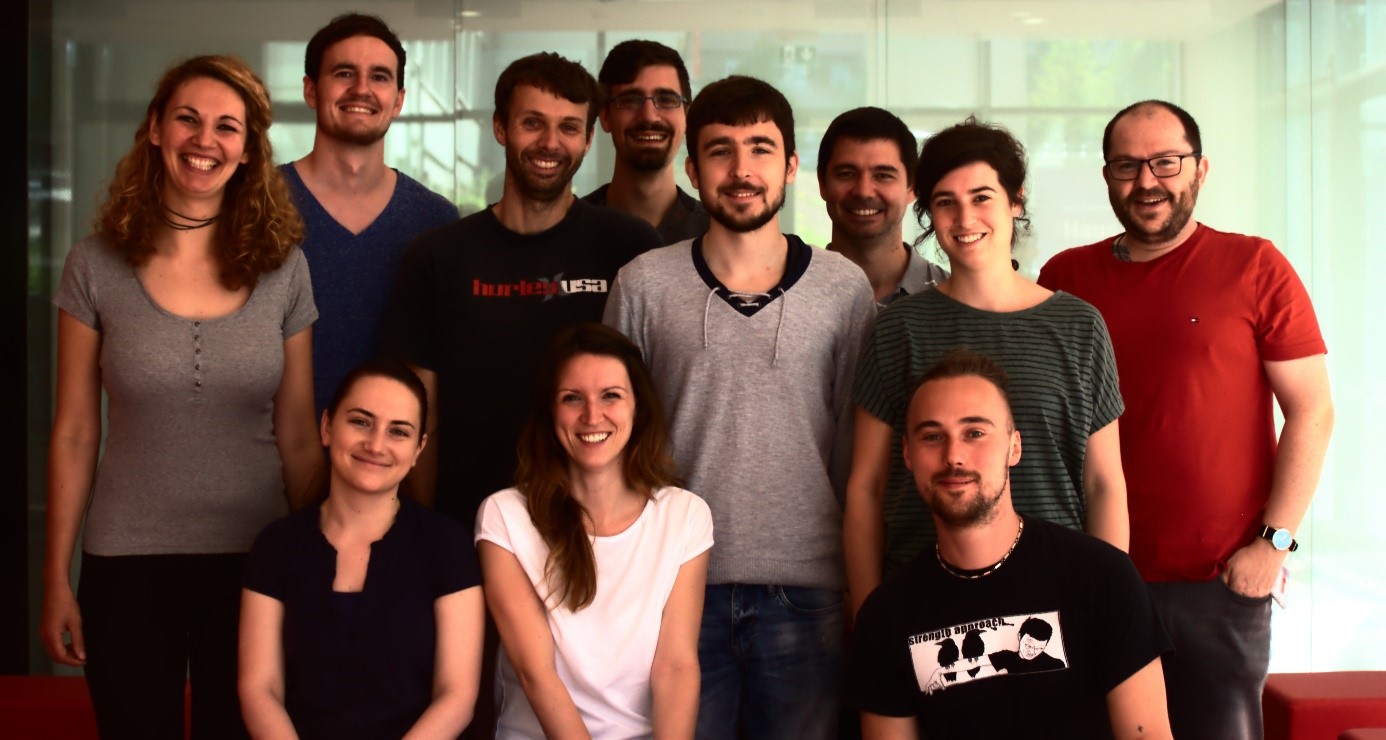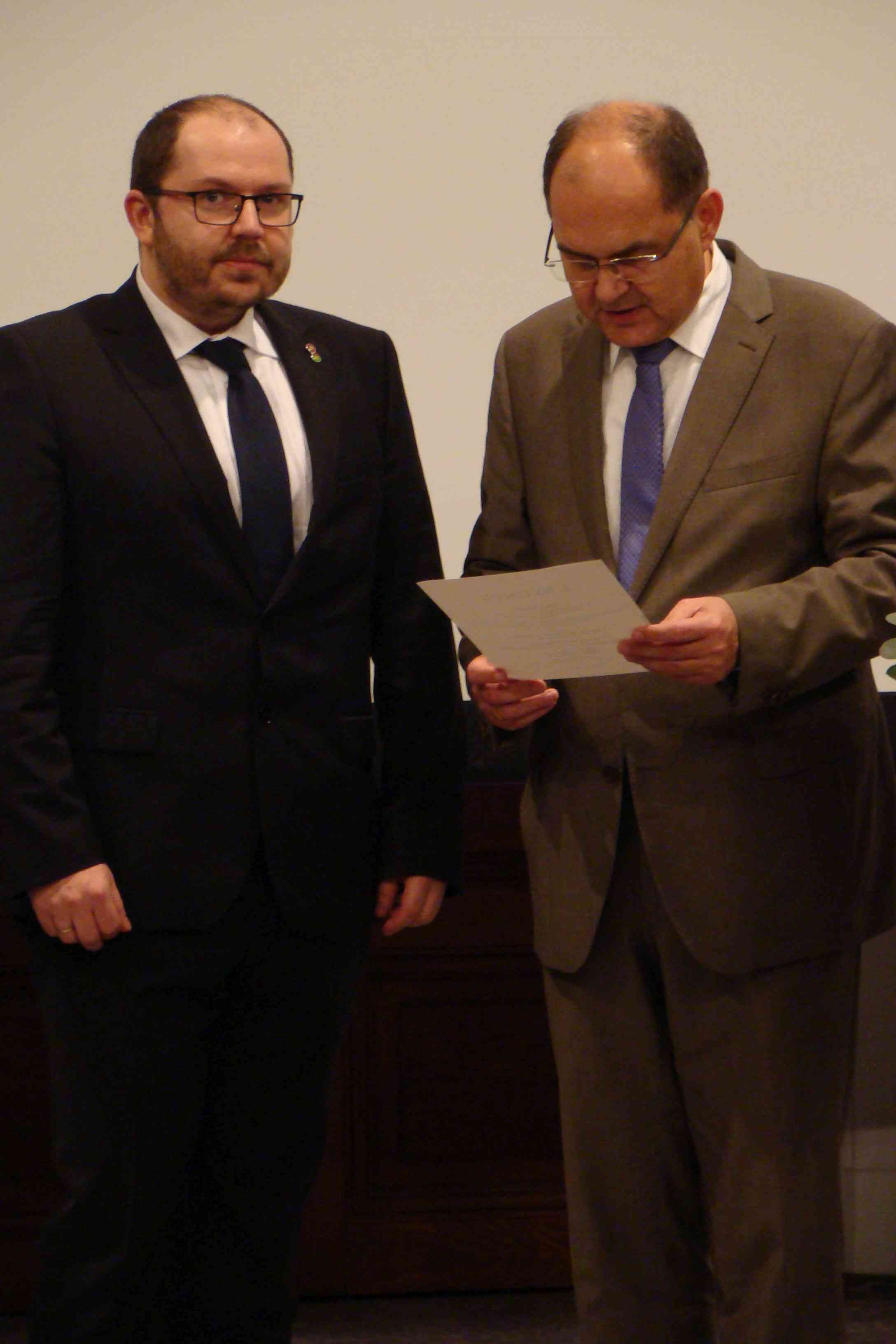“...I’m convinced that these systems will fundamentally change biomedical research...”

That’s what winners look like. Successful research work only works in a team. Junior research group INSPIRE with PD Dr. Alexander Mosig (right rear).
Photo: Jena University Hospital, Center for Sepsis Control & Care
Dr. Alexander Mosig is the head of the junior research group INSPIRE (biochip-based organ models) at the Integrated Research and Treatment Center for Sepsis Control & Care at Jena University Hospital. The team conducts in vitro research on the human immune system, specifically in small (credit card size) microfluidic systems, also known as organ-on-a-chip systems.
In collaboration with other working groups, the team uses different miniaturised organ-on-a-chip systems (liver, kidney, bone tissue, lung, blood-brain barrier) to investigate such questions as the effects of sepsis and how the body’s own immune cells can distinguish useful endogenous microorganisms from pathogenic exogenous organisms. The team also uses the models to research organ dysfunctions but also tests potential new pharmaceutical treatment methods.
In a recent research paper, the team investigated the part innate immune system cells (macrophages) play in the progression or inhibition of tumour development and the influence pharmaceutical substances can have in this context. Endothelial cells from umbilical cord blood and breast cancer cells were cultured on a bio-chip (tumour-on-a-chip) and the desired immune cells with specific characteristics (M1 and M2) added and cultured.
The working group is currently looking for a master’s degree candidate for research into the macrophage function in a liver-on-a-chip model.

Awardee Dr. Alexander Mosig and the Minister of Nutrient and Agriculture, Christian Schmidt.
Photo: Christiane Hohensee
InVitro+Jobs interviewed this year’s Animal Welfare Research Award recipient, Dr. Alexander Mosig, about his research and prospective developments in organ-on-a-chip systems.
InVitro+Jobs: Congratulations on the Animal Welfare Research Award, conferred today in Berlin. The title of your presentation will be “Microphysiological Systems as a Tool for Reducing Animal Testing in Immunological Research”. What is it about?
Dr. Alexander Mosig: At the Integrated Research and Treatment Center for Sepsis Control & Care in Jena, we have developed methods with which we can investigate the human immune system’s reaction to infections. These immunological reactions are very different, depending on the organs they take place in. For instance, on the one hand bacteria in the intestinal microbiome are tolerated and there they are extremely important for our health, whereas in the other hand bacteria in the bloodstream or the liver must be actively combated, as they could cause a life-threatening infection. In order to better understand the underlying immune defence processes and the targeted tolerance toward commensal microorganisms in our bodies, we have developed simulations of organs on a bio-chip. These so-called microphysiological systems are often also called organ-on-a-chip systems.
InVitro+Jobs: Have you also studied the mechanisms with which tumour cells reprogram immune cells so as to not eliminate them but actually even help them?
Dr. Alexander Mosig: The immune system is not only important for fending off infections, but also combats nascent tumour cells. Macrophages, important cellular components of our immune system, play an especially important part in this regard. This is why we have developed systems in which we can simulate central tumour components on a bio-chip under physiological culture conditions. This system allowed us and colleagues from pharmacology to make sense of the effect mechanisms of a variety of substances and show that these substances are able to reprogram macrophages to specifically attack and kill tumour cells.
InVitro+Jobs: Which experiments on animals do you want replace with your models? How relevant would laboratory animals be in those experiments, and if they were, what makes them irrelevant in this case?
Dr. Alexander Mosig: The spectrum of replaceable animal experiments is broad. Especially in immunological and infectiological research, mice and rats are often used. However, there are distinct differences between the immune systems of mice and humans. During the course of evolution, different habitats and diets have led to the development of different strategies for dealing with inflammation and infections. Results from the mouse model are therefore not simply directly applicable to humans. Many remarkable studies have been published that demonstrate that single genes or proteins are involved in the genesis of different diseases. However, the limited applicability for humans makes developing therapeutic approaches based on these results difficult. As I see it, we still need a combined strategy of in vitro models and animal models. In vitro methods allow us to work with human cells, but they don’t provide the degree of complexness that an animal model does. On the other hand, animal models have species-specific differences to humans. By combining both methods we can nonetheless already conduct many experiments in complex human cell culture models instead of using animals. At present we unfortunately still need a final validation using an animal model. Thus we can currently already effectively reduce animal experiments, but unfortunately we can’t yet replace them entirely. That will be the task for the coming years.
InVitro+Jobs: How far are the researchers with the development of (multi)organ-on-a-chip models?
Dr. Alexander Mosig: We are at the beginning of an exciting development and the first results are encouraging. The technology has increasingly attracted media attention and offers enormous potential. Almost every week there are new and sometimes groundbreaking developments in this area. I am convinced that these systems will fundamentally change biomedical research. Major international pharmaceutical companies already use organ-on-a-chip systems in their research to reduce animal experiments. A complete reproduction of entire organs with all their functions on a chip still remains to be achieved. The reproduction of the whole human body on a chip (human-on-a-chip) is therefore more vision than reality.
InVitro+Jobs: Which organ-like systems can immune cells already be integrated into today?
Dr. Alexander Mosig: There are different systems and approaches, depending on the respective questions being looked into. Immune cells are practically in direct contact with all the organs in our body. Some components of the immune system have therefore already been successfully integrated into microphysiological models for reproducing the liver, intestine, kidneys, lungs and other organs.
InVitro+Jobs: Is it difficult integrating the immune system into miniaturised human tissue? How is that done?
Dr. Alexander Mosig: The main challenge is isolating living, unactivated immune cells. We mostly use immune cells from blood. Their isolation and cultivation is very standardisable and takes comparatively little time, whereas obtaining suitable immune cells from tissues, for instance the liver, is considerably more difficult and time-consuming. We are working with partners on suitable solutions.
InVitro+Jobs: Do scientists routinely have to integrate immune cells into the organ-on-a-chip models?
Dr. Alexander Mosig: The advantage of organ-on-a-chip systems is their scalability, which lets them be adapted to suit the respective study’s topic. Immune cells play an important part in many processes in the body. They can amplify the toxicity of substances, or either positively or negatively influence the course of diseases. However, whether immune cells should actually be integrated into organ-on-a-chip systems depends very much on the study and its objectives. It’s certainly not always necessary and is ultimately a cost-benefit consideration.
InVitro+Jobs: What’s next – the hormone system?
Dr. Alexander Mosig: That is definitely an important field of research, in which we will see many important developments in the next years. Our work will primarily be focussed on reproducing the microbiome in organ-on-a-chip systems. It is estimated that there are five to ten times as many microorganisms in our bodies as there are body cells. A disturbance of the sensitive equilibrium between the microbiome and the host can therefore also lead to diseases. Biosystems engineering allows us to observe and analyse these complex interactions for longer periods of time. Of course the immune system plays a central part in the interaction between the microorganisms and the different organs.
InVitro+Jobs: What is still needed to replace animal testing in systemic toxicology?
Dr. Alexander Mosig: There is still much work ahead of us and the systems must be further improved, in order to obtain more precise results. We will probably see large studies, in which the parameters for single toxicity analyses using organ-on-a-chip systems will be described in detail. These data could be used to tackle the official approval of the systems by regulatory bodies for testing active agents and hazardous substances. A successful approval within the mandatory statutory validation could bring the breakthrough in toxicological testing.
InVitro+Jobs: In a recent interview with the Frankfurter Allgemeine Zeitung*, the dean of Charité in Berlin called for a paradigm shift in funding policy, saying the responsible bodies simply did not do enough for alternatives to animal testing. Do you share that opinion?
Dr. Alexander Mosig: I entirely agree with Prof. Pries about the need for a paradigm shift in funding policy. His idea of a fixed percentage of funding for developing and providing alternatives to animal experiments is an interesting suggestion and I am intrigued to see how the funding bodies will react to that. Increasing funding made available for individual replacement methods will certainly not be sufficient, however. There must be more movement in this regard, especially regarding infrastructural measures as the basis for a sustainable development of replacement methods. That is why I am very happy that Charité intend to take courageous and good step with their planned “Einstein Center for Alternatives in Biomedical Research”.
InVitro+Jobs: Has it ever happened to you in the context of the publication process that an editor demanded you conduct an additional animal test, even though it would have been entirely irrelevant to the topic in question?
Dr. Alexander Mosig: It hasn’t happened to me personally, but I do know colleagues who have told me about similar occurrences.
InVitro+Jobs: Thank you for the interview.
* http://www.faz.net/aktuell/wissen/leben-gene/ein-berliner-institut-fuer-alternative-zu-tierversuchen-15260615.html




 Dr. rer. nat.
Dr. rer. nat. Menschen für Tierrechte - Tierversuchsgegner Rheinland-Pfalz e.V.
Menschen für Tierrechte - Tierversuchsgegner Rheinland-Pfalz e.V.